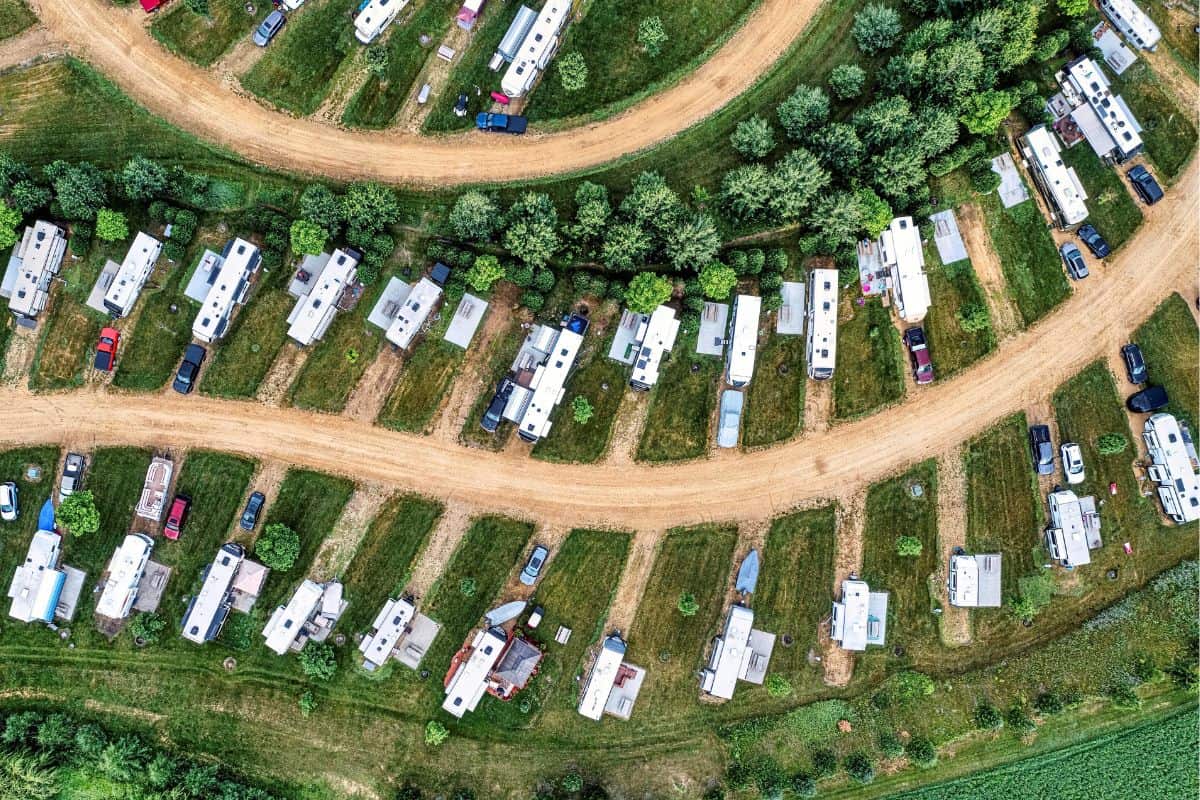More and more people are trading their permanent addresses for life on the road and full-time RV living.
And why wouldn’t they? I mean who doesn’t want adventure, beautiful scenery, and the freedom of the open road?
But before you sell your house, buy an RV, and move in, you should know the pros and cons of this RV lifestyle. Because, while full-time RV living might be a dream come true for some, it can be a nightmare for others.
So to help you figure out which camp you might belong to, we created this full-time RV living pros and cons list.
Full-Time RV Living Pros:
Travel Lifestyle: Go Where You Want, When You Want
One of the best aspects of full-time RV living is the unmatched freedom.
This travel lifestyle means never being stuck in one place again. When neighbors get annoying, you simply hitch up and find a better spot. Feel like spending extra time near family for the holidays? No problem, just park nearby for as long as you’d like.
You can also follow 70-degree weather across the country or chase specific experiences, like autumn in New England, spring wildflowers in Texas, or summer festivals in the Pacific Northwest.
This flexibility creates a sense of control over your life that traditional living can’t match.
Adventure & Variety: Never Get Bored Again
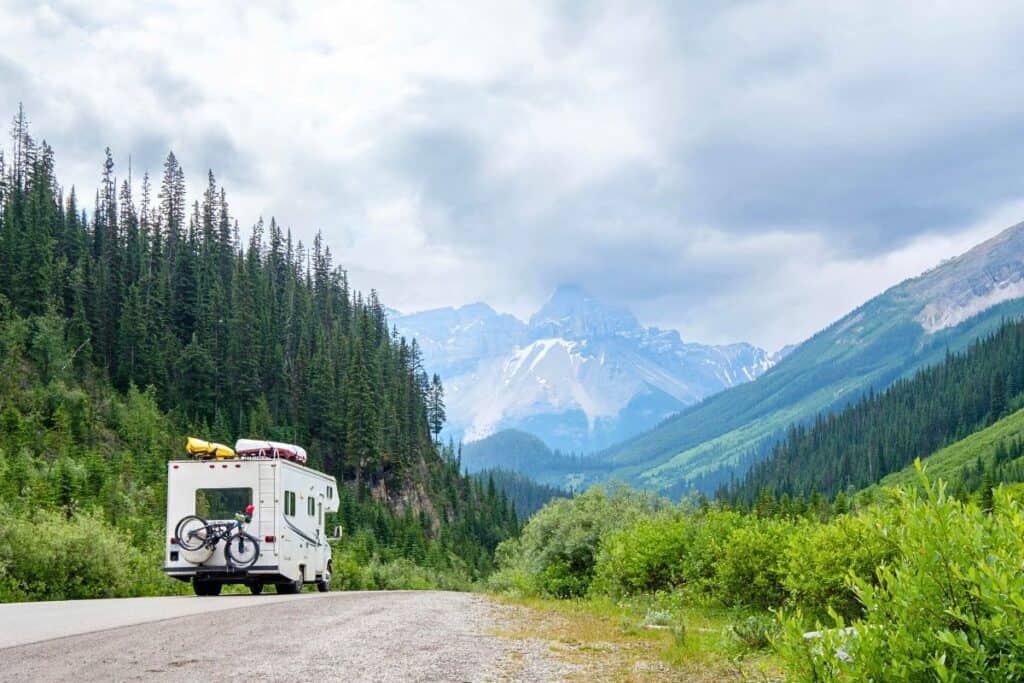
Are you tired of the same old routine? That’s not a problem in RV life, because full-time RV living offers endless adventure.
One week you could be hiking through ancient redwoods in California, while the next week you’re sampling authentic Cajun food in Louisiana. The constant change keeps your brain firing on all cylinders, studies even show that unique experiences boost cognitive function and happiness levels.
The variety isn’t just in landscapes though it’s in the daily rhythm of life. Tuesday might find you kayaking a crystal-clear spring, Wednesday learning traditional basket weaving from a local artist, and Thursday exploring a quirky small-town museum.
This lifestyle crushes the “same old, same old” routine that dulls many lives.
Minimalist Lifestyle: Less Stuff, More Life
There’s something liberating about downsizing from a house full of stuff to just the essentials that fit in your camper.
Full-time RV living forces you to confront our culture’s obsession with accumulating things.
You quickly learn which possessions enhance your life and which are collecting dust. That bread maker that you used 5 years ago? Gone. The fifteen pairs of shoes you rarely wore? Narrowed down to your favorite three.
The process is equal parts challenging and freeing, like squeezing your life through a filter that catches all the unnecessary junk.
What remains is quality over quantity. Your wardrobe becomes versatile pieces you actually wear. Your RV kitchen holds multipurpose tools you use daily. This streamlined existence shifts your focus from managing stuff to creating experiences.
Closer Connection with Nature
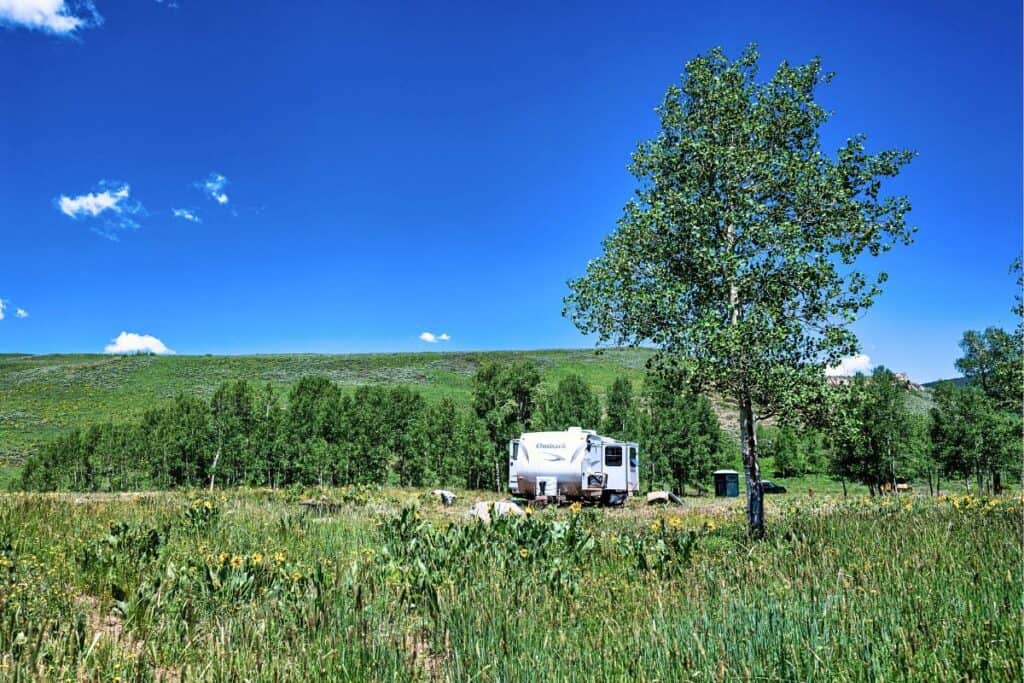
Picture stepping outside with your morning coffee to watch dolphins playing in the surf just yards from your doorstep. This isn’t a vacation, it’s Tuesday in your full-time RV life.
Traditional housing keeps nature at arm’s length, something to visit on weekends if the weather’s nice. But RV living removes this barrier. Your backyard might be the Grand Canyon one week and Yellowstone the next. The natural world becomes your living room.
This proximity to nature nourishes something primal in us that modern life often starves. Many full-timers report sleeping better, feeling less stressed, and experiencing a profound sense of connection to the planet.
Escape the Rat Race
The conventional life hamster wheel of mortgage payments, lawn maintenance, and keeping up with the Joneses suddenly stops spinning when you hit the road. Your time becomes truly yours again. No more sitting in traffic or working overtime to pay for a house you’re barely at.
RVers who switch to RV life often state a natural shift in priorities, measuring wealth in experiences and freedom rather than square footage and possessions.
The corporate ladder looks different from the road too. Many full-timers create location-independent income streams or work seasonally, embracing the radical concept that life shouldn’t revolve around work, but rather work should support your life.
Stronger & Closer Relationships
There’s nothing quite like sharing 200 square feet with your partner. While it sounds challenging (and sometimes it is), limited space creates opportunities for connection. Without separate rooms to retreat to, you learn to communicate more openly and resolve conflicts quickly.
The shared adventures become a powerful connection. Navigating a tricky mountain pass together, troubleshooting a broken water pump, or discovering a hidden waterfall create memories and inside jokes that last a lifetime.
For families, the quality time multiplies even more. Parents often find deeper connections with their children, with conventional distractions stripped away and adventures taking their place. Dinners together aren’t just occasional events, they’re daily opportunities for conversation.
Really Experience the Country
America’s vastness can’t be appreciated through occasional vacations. Full-time RVing lets you experience this incredible country at a leisurely pace.
You’ll discover that Texas Hill Country wildflowers in April are worth planning your entire year around, or that Michigan’s Upper Peninsula in fall defies description.
You’ll stop seeing states as colored shapes on a map and start experiencing them as distinct cultures and landscapes. The accents, regional foods, local traditions, and hidden gems become part of your life.
Beyond the postcard views of national parks, you’ll discover charming small towns that offer world-famous apple pie and festivals celebrating everything from crawfish to garlic. Also, history comes alive when you can follow the Lewis and Clark trail, wander Civil War battlefields, or drive on Route 66.
Potential Cost Savings
Full-time RVing can be cheaper than maintaining a traditional home, with no mortgage payments, property taxes, utilities, and yard maintenance.
The beauty of this lifestyle is its financial flexibility. Boondocking on public lands can mean weeks of free camping, while membership programs like Thousand Trails can slash your campsite costs.
Plus, you’ll find yourself naturally spending less on “stuff” since there’s nowhere to put it!
Notice how I said potential though, because a common misconception about RV life is that it’s way cheaper than traditional life. In reality though, while RV life can be cheaper, there are still plenty of expenses that add up quickly like RV payments, fuel, campsite fees, maintenance/repairs, and insurance.
RV Community = Instant Friends Wherever You Go
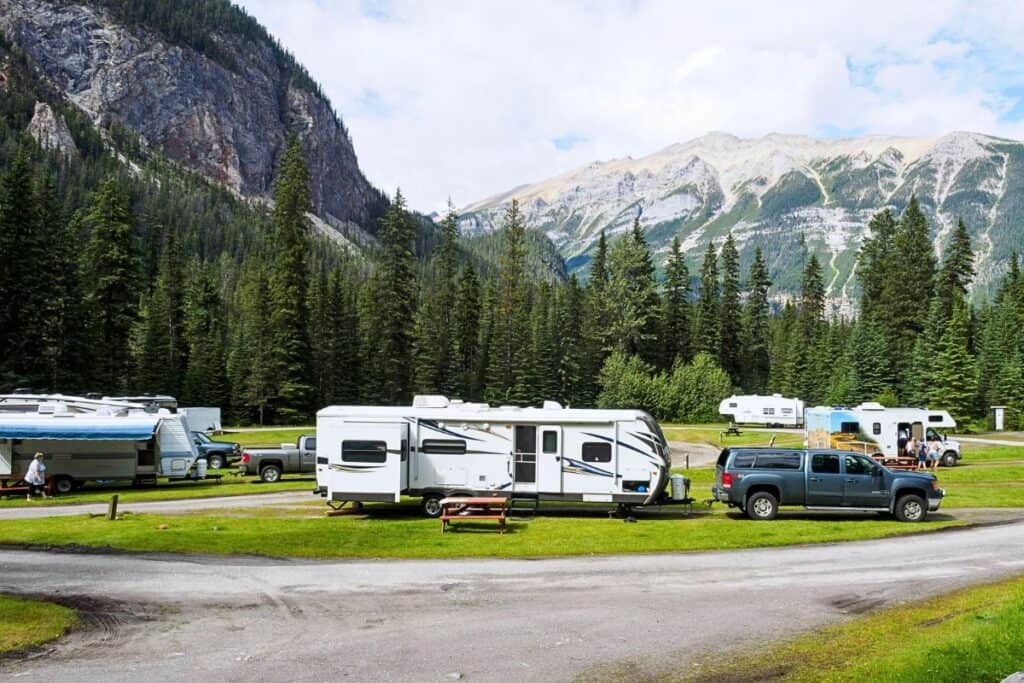
Some of the nicest people you’ll ever meet are fellow RVers.
Don’t believe me? Just pull into a campground, and within hours, you’ll receive plenty of hellos, invitations to campfires, and tips on the best places to eat or visit locally. And if you need a helping hand, there’s never a shortage of people willing to assist you.
Whether attending organized rallies or just chatting at the dog park, you’ll connect with people from all walks of life who share your love of freedom and adventure.
Hands-On Learning for Kids
Imagine your children learning about geology while actually touching ancient rock formations in Utah, or studying marine biology while tide-pooling on the Oregon coast. Full-time RV living transforms education from textbooks to actual lived experiences.
Kids in RV families often develop impressive independence and practical skills.
The flexibility also allows you to follow your child’s interests. Are they fascinated by dinosaurs? Spend a week at Dinosaur National Monument in Utah, Dinosaur Ridge in Colorado, or Cabazon Dinosaurs in California. Do they love space? Spend a week parked outside Kennedy Space Center in Florida or Starbase in Boca Chica, Texas to see an actual rocket launch.
The world becomes their classroom, history comes alive at actual historic sites, and science happens through hands-on experiments rather than reading about someone else’s discoveries.
Full-Time RV Living Cons:
Limited Space & Storage: Downsizing Reality
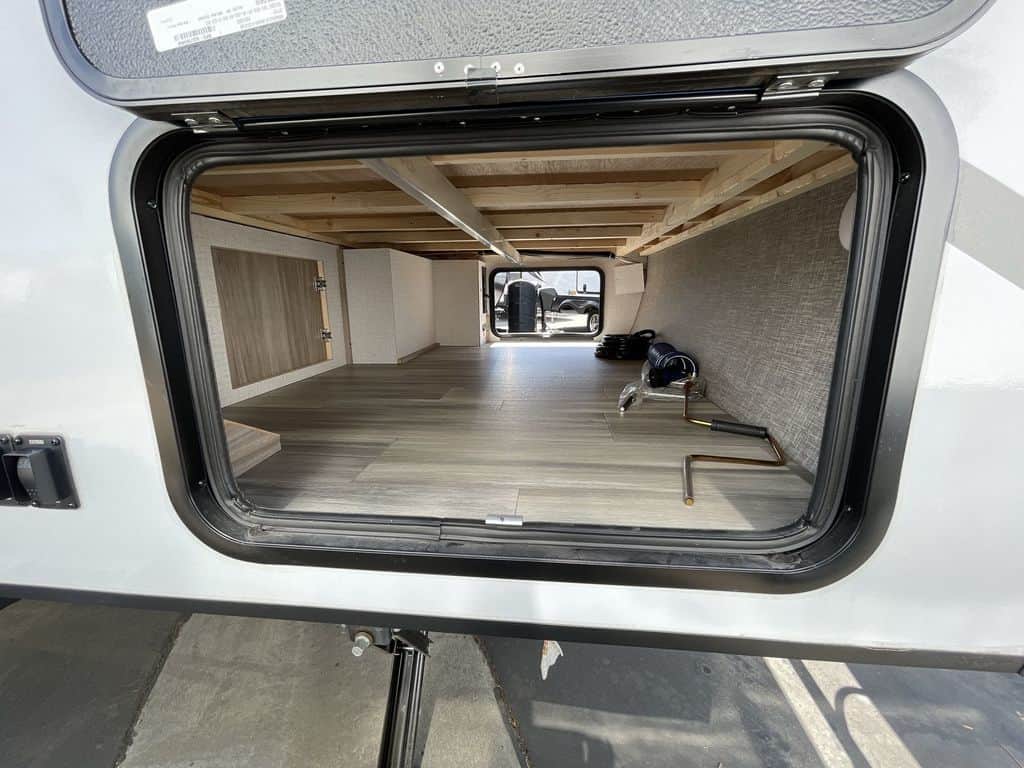
Let’s get real about one of the biggest challenges of RV living, you’re going from a house with multiple bedrooms, a garage, and maybe a basement to a space that’s smaller than most bedrooms.
Going from a walk-in closet to a 24-inch wide wardrobe that has to hold all your clothes.
Seasonal items can be particularly challenging. Where do you store RV holiday decorations for 11 months? What about winter coats during summer travels? Many full-timers end up renting small storage units or utilizing family members for truly irreplaceable items they can’t bear to part with but don’t need daily.
Ongoing Maintenance & Repairs: Your Home is a Vehicle
RV living means your home is now a complex machine filled with intricate systems like plumbing, electrical, and appliances all being jostled down a bumpy highway at 55 mph. Something is always breaking, loosening, or wearing out, it’s not a question of if, but when.
That slide-out that worked perfectly yesterday? It might decide to stick halfway in during a rainstorm. Your refrigerator might suddenly refuse to run on propane the day you arrive at a boondocking spot. These aren’t occasional annoyances, they’re regular aspects of RV life.
Also, unlike a traditional home where you can call a specialist, finding qualified RV repair technicians often means waiting weeks for appointments or driving hundreds of miles.
Many full-timers eventually become reluctant DIY experts out of necessity. You’ll find yourself watching YouTube tutorials at odd hours and joining RV repair Facebook groups for emergency troubleshooting advice.
The RV maintenance schedule is also relentless that includes checking roof seals, sanitizing water systems, servicing your generator, and maintaining your tow vehicle or motorhome engine.
RV Life Can be Exhausting
Nobody shows the exhausting side of RV life on Instagram. Those gorgeous mountain backdrop photos don’t capture the two hours spent leveling your rig on a slope, or the mental fatigue of researching your next destination. The constant decision-making can really wear you down over time.
Travel days can be particularly draining. Breaking down camp, driving for hours while staying vigilant about clearances and road conditions, then setting up again, it’s a full day’s work before your “real life” can even happen.
Also, each new location means learning new systems, finding essential services, and establishing new routines. Even simple tasks like getting mail and packages become much more challenging while on the road.
More Exposed to Weather
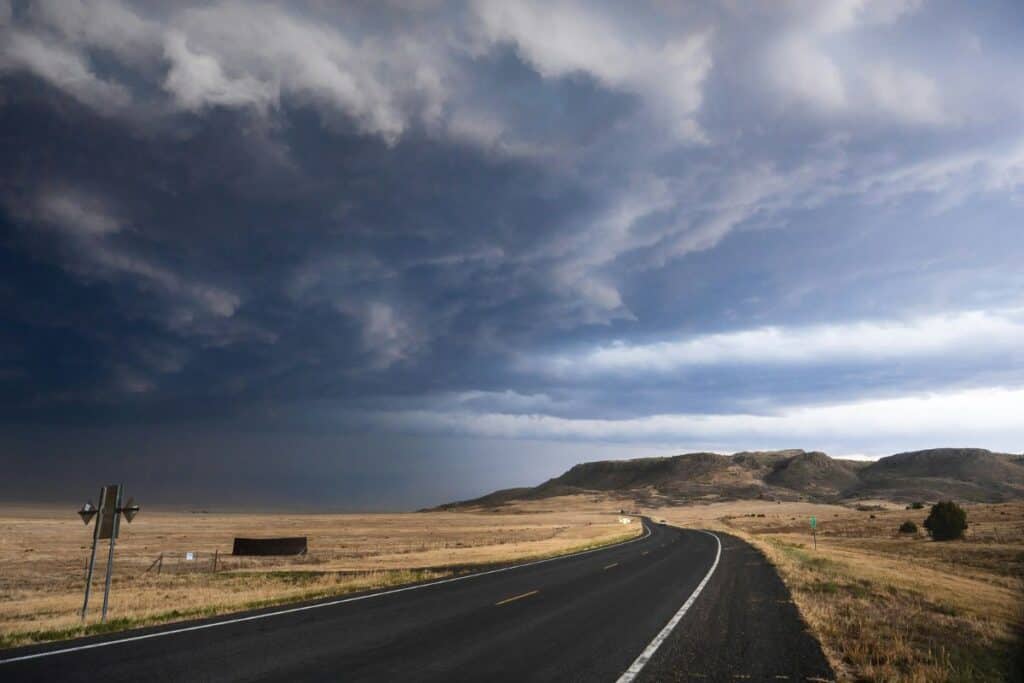
When your walls are inches thick and your home weighs less than 15,000 pounds, weather becomes more than small talk, it’s a force that directly impacts your daily life.
That gentle summer rain? It sounds magical until you realize your roof has a tiny leak that’s now dripping onto your bed.
Winter brings its own challenges like pipes freezing, condensation building up on windows, and propane heaters working overtime. Summer heat can be even more challenging. Your air conditioner might struggle to keep up when temperatures soar past 95°F, and that’s when you’re connected to shore power. Because if you’re boondocking you can forget about airconditioning.
High winds also create another layer of anxiety. When your home starts rocking in 40 mph gusts, you’ll find yourself checking weather apps obsessively and potentially changing travel plans to avoid areas with wind advisories. Did you know that winds over 60 miles per hour can potentially flip a 5th wheel?
Internet Connectivity Issues
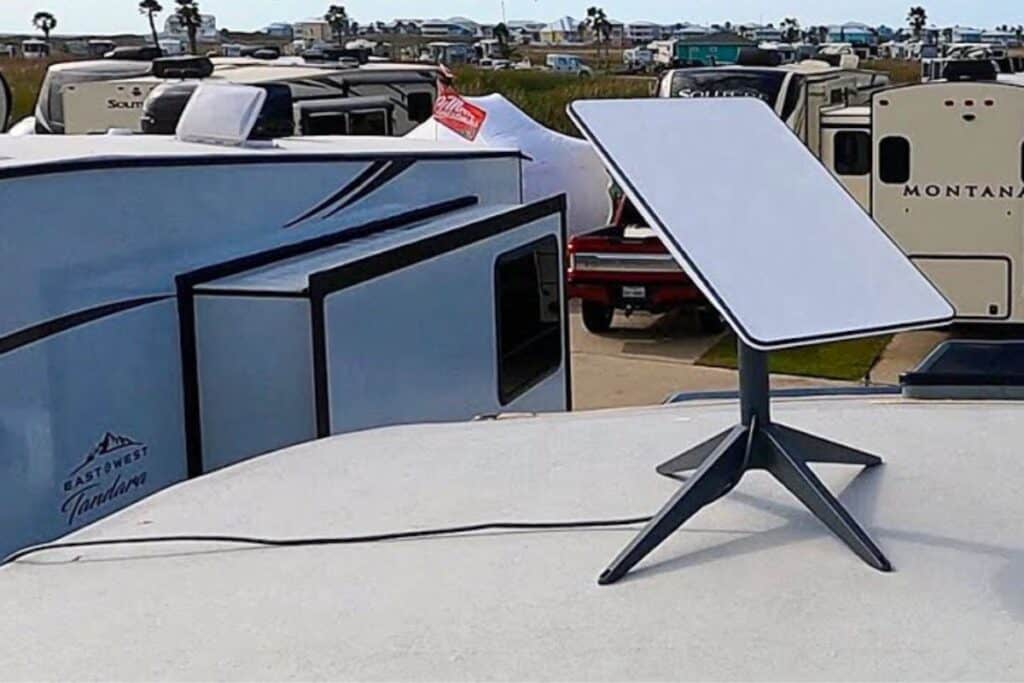
“Sorry, I’m cutting out!” becomes your catchphrase during work calls in rural America. The digital nomad dream crashes into reality when you discover that stunning mountain locations have absolutely zero cell service, not even one precious bar.
You’ll find yourself holding your phone to the sky, walking in circles around your RV trying to catch that elusive signal. You’ll invest in boosters, antennas, multiple carrier plans, and eventually, expensive satellite options like Starlink.
The connectivity hunt shapes your travel decisions in surprising ways. You’ll find yourself choosing less scenic locations with better signals over gorgeous spots where you’d be completely disconnected.
Work Challenges
The dream of working remotely while traveling sounds great until you face the realities of maintaining a steady income from the road.
Traditional employers often balk at the idea of a worker with no fixed address, and explaining your lifestyle during job interviews can raise immediate red flags for some companies.
Remote work opportunities have expanded dramatically, but competition is fierce. You’re now competing with digital nomads worldwide for location-independent positions. Many full-timers cobble together multiple income streams, like part-time remote work, seasonal jobs, content creation, and online businesses to create financial stability.
Also, tax and legal considerations add another layer of complexity. You’ll need a home state for your “permanent” address, mail forwarding services, and possibly a business entity if you’re self-employed.
Home School Challenges for Families

On paper, road-schooling your kids while traveling sounds idyllic, learning history at actual historic sites and biology in national parks.
The reality, however, is that it requires serious planning, consistent execution, and often navigating a maze of different state requirements.
For example, each state has unique homeschooling laws, and as full-time travelers, you’ll need to understand which regulations apply to your situation. Some states require standardized testing, specific curriculum approval, or regular portfolio reviews.
Also, the teaching responsibility falls squarely on parents’ shoulders, adding yet another full-time job to an already busy life.
Socialization concerns are real too. While RV kids often develop impressive social skills from meeting people of all ages, building lasting peer relationships requires intentional effort, seeking out homeschool meetups, joining traveling families groups, or planning extended stays where friendships can develop.
RV Life Isn’t Cheap
One of the biggest misconceptions about RV life is that it’s cheap. While RV living can be economical, the reality often surprises RV newcomers with unexpected costs that quickly add up.
Fuel expenses can devour budgets faster than you’d imagine. Moving your home regularly means filling up a vehicle that might get 7 to 10 mpg when towing or driving a motorhome. A single travel day can easily cost $150 to 200 in fuel alone. Many full-timers discover they travel less frequently than planned simply because of this expense.
Also, campground fees have skyrocketed in recent years. Popular destinations often charge $50 to 100 nightly for basic sites with hookups. Even with discount clubs and monthly rates, budget-friendly camping is becoming increasingly scarce.
It’s also worth noting that many new RVers plan to boondock extensively, only to discover they’re not comfortable with remote off-grid living.
Another big budget-buster is repairs and maintenance. RVs depreciate rapidly while requiring constant upkeep. A single major repair like transmission failure or slide-out problems can instantly wipe out months of careful budgeting.
Constantly Figuring Out Where to Park Your Home
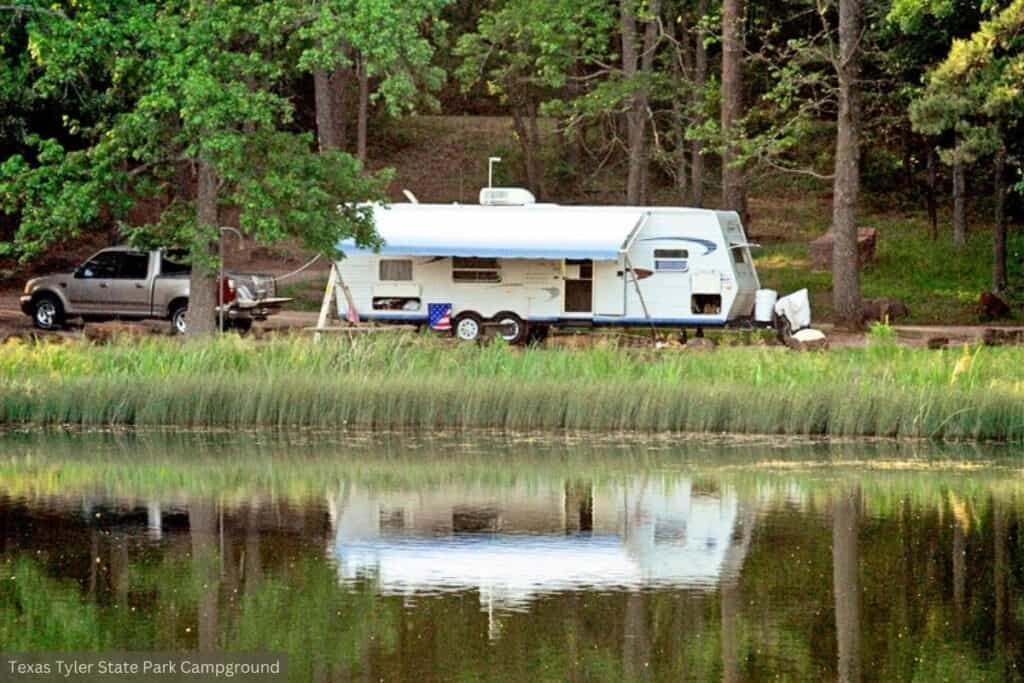
The days of rolling into a campground without reservations are largely gone. Today’s RV reality involves booking popular destinations 6 to 12 months in advance, especially during peak seasons.
Even with planning, you’ll face frustrating situations. National park campgrounds often fill instantly, leaving you scrambling for alternatives miles away from the attractions you came to see.
Also, urban areas present unique challenges, for example, many cities have strict ordinances against overnight parking, even in commercial lots. Finding spots near family during holidays can also be challenging.
The reality is that the explosive growth in RV ownership has far outpaced campground development. More RVers compete for the same number of spaces, creating a genuine housing crunch on wheels. This forces many full-timers to adopt a hybrid approach, planning far ahead for must-visit destinations while maintaining flexibility with backup options.
RV Life Can Be Isolating
Despite the vibrant RV community, there’s a loneliness that can creep in when you’re constantly moving. Those deep, long-term friendships that sustain us through life’s challenges are harder to nurture when you’re never in one place for long.
The holidays hit particularly hard. While your family gathers for Thanksgiving dinner, you might be parked alone in a campground hundreds of miles away. FaceTime calls help, but they’re poor substitutes for real hugs and shared meals. Birthday celebrations, graduations, and important life events pass with you watching from afar.
For introverts, the social demands can be exhausting in different ways. Campground culture often involves spontaneous gatherings and unexpected knocks on your door. Finding the perfect balance between community engagement and necessary alone time becomes yet another skill to master on the road.
Final Thoughts on Full Time RV Living Pros and Cons
Full-time RV living offers freedom, adventure, and unlimited nature. However, it also comes with significant challenges like limited space, constant maintenance, and complicated logistics.
So before selling your home, honestly assess whether the freedom of the open road outweighs the comfort and stability of traditional living.
This lifestyle isn’t for everyone, but for some, it’s absolutely worth it.
Additional Full-Time RV Living Resources:
- 24 Things You Should Never Do While Full-Time RV Living
- 22 Must-Have Items You Need for Full-Time RV Living
- Best RV Parks for Full-Time Living: By State
Recent Posts
When cruising down the highway in your RV, the last thing you want is a tire blowout! Not only is it dangerous, but RV tire replacement isn't cheap, costing $200 to $300 per tire. The good news,...
Nothing ruins an RV adventure faster than a breakdown with no way to fix it. Because of this, every RVer should have a well-stocked RV tool kit for those unexpected roadside emergencies and campsite...

